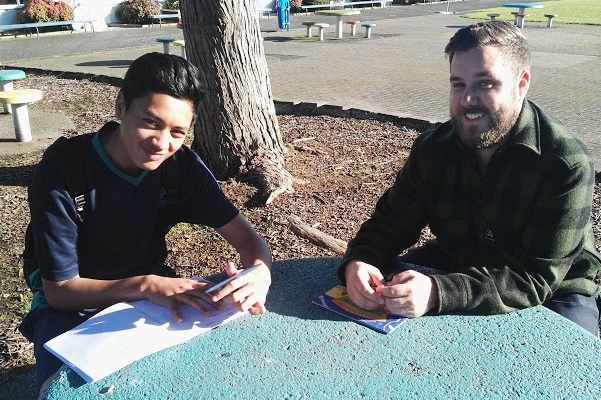
A scheme that connects pupils in low decile schools with university student mentors has received a funding boost of more than $500,000.
The MATES programmes have received $216,000 from the Ministry of Youth Development and $300,000 from the Vodafone Foundation which, combined with other regular supporters, will allow it to continue in Auckland.
MATES (Mentoring and Tutoring Scheme) has paired tertiary students with young people in year eight and year 13 in schools around the Auckland region for the past 14 years. During a weekly two-hour session after school, mentors complement what’s happening in class with extra support at crucial transition points; from intermediate to secondary and from secondary to further education, training and employment.
Pairs are initially connected through common interests, then follow a loosely structured programme led by the young person’s needs. Many of the MATES student mentors study the theories behind what they’re doing in a second-year course at Auckland University taught by Dr Pat Bullen, a committed academic voice at the forefront of youth mentoring. Dr Bullen was the recipient of a $90,000 Vodafone World of Difference Fellowship in 2014 which allowed her to travel to study mentoring programmes internationally.
MATES Junior regional manager Andrew Dawson says the wonderful thing about the programme is that young mentees get a chance to set goals, to imagine wider horizons and enage with a person who is neither teacher nor parents, but more of a friend.
“It’s been great to hear that since the programme’s inception, many mentees who were part of a mentoring pair have achieved well academically,” he says.
Mansell Senior School in Papakura has been successfully running MATES Junior for four years, and principal Rebecca Kaukau says the children who chooose to take part see it as an hornour and a leadership opportunity, and the relationship between mentor and mentee goes both ways.
“The children teach their mentors about the school’s values, and they get to share kai and to play host.”
Mansell is 75 per cent Maori and 25 per cent Pasifika students, and currently has 14 pairs who meet once a week at the school. The programme also runs at Avondale and Waimahia intermediate schools in Auckland.
The much-delayed English draft curriculum is now out for consultation, generating discussion from teachers.
Research from AUT demonstrates arts, culture and recreation have positive impacts on all aspects of…
How effective has the school phone ban been in achieving its aims? Researchers from the…
School camps and excursions deliver hands on learning experiences, helping to consolidate classroom learning.
Innovations in AV technologies present new opportunities to engage with students. We look at how…
A new report from the University of Auckland’s Our Voices Project asks young people what…
This website uses cookies.